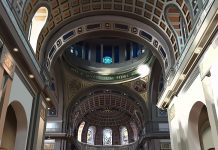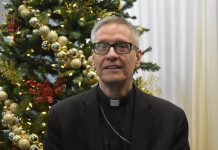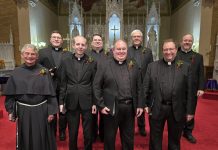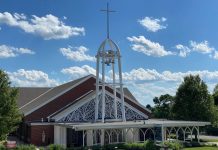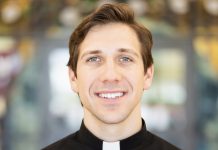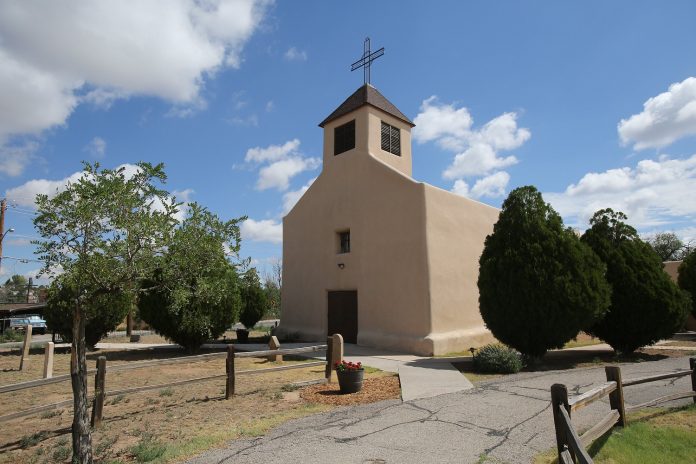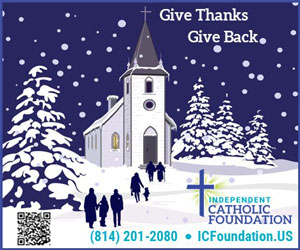ALBUQUERQUE, N.M. (CNS) — Archbishop John C. Wester said a decision to close Catholic churches in the Santa Fe Archdiocese for indoor worship amid a new wave of COVID-19 cases in New Mexico “is both prudent and necessary.”
In a statement issued late Nov. 2, the archbishop said that “many of the Catholic faithful in the Archdiocese have agreed with, and expressed appreciation for, the decision to close churches for indoor worship, several persist in concern and have reached out to me.”
In respect for their opinions he said, he met earlier that day “with the COVID-19 Response Team today to seek once again their insight and advice.”
“From our discussion, we have determined that the current course of action is both prudent and necessary. However, it is important to remember that this action is in no way permanent,” the archbishop said, adding that assessments of the situation will be ongoing “in the hope that we can ease restrictions sooner than later.”
“Hardship is neither pleasant nor welcomed; we continue to seek the common good of all of God’s creation,” Archbishop Wester said.
On Oct. 31 New Mexico Gov. Michelle Lujan Grisham said the spread of the coronavirus “is out of control” in the state, according to an AP story. She urged residents to stay home and avoid large gatherings. As of Nov. 3, New Mexico had a total of 48,104 cases and 1,036 deaths. A graph shows that cases have steadily increased since Sept. 25.
Archbishop Wester said the fact “COVID-19 cases and deaths have risen at a rapid rate and have reached alarming numbers” was a main factor in closing churches for indoor worship.
“Even when observing protocols, policies and procedures, there are still many who are contracting the virus,” he noted “Hospitals are already sounding the alarm, with hospitalizations increasing throughout the state.”
Archbishop Wester also pointed out that “many of our priests, staff, teachers and parishioners are in the vulnerable age category, with mortality rates increasing with age.”
“Many care for family members who are elderly and/or have underlying health conditions,” he explained. “A person can be an asymptomatic carrier for weeks, unknowingly infecting those with whom he or she comes in contact — a situation magnified in the winter season with persons remaining in close proximity.
“We also know the virus is no respecter of age or circumstance. There are even young people without underlying conditions dying from this disease.”
He said he is being told by government officials at all levels “they are extremely worried and are doing all they can to keep people from large gatherings indoors for extended periods of time.”
Catholics in the Santa Fe Archdiocese “number in the hundreds of thousands,” Archbishop Wester said, which means “even with only a 40% attendance, this still amounts to close to 130,000 gathered on any given Sunday.”
“Sadly, the pandemic and its subsequent protocols have been highly politicized,” he added. “We could debate issues endlessly, or cherry-pick reports which fit one’s own presumptions. I believe that we must always act quickly and decisively when human life is at stake.
“If in retrospect the archdiocese makes an error in responding to the pandemic, then I would rather err on the side of protecting human life.”
Archbishop Wester has granted dispensation from attending Mass until further notice due to the pandemic. Churches may be open for individual devotion and prayer, he said.
Outdoor Masses can be celebrated as long as those attending observe all safety protocols, including wearing masks, social distancing and hand-washing, he said. Holy Communion can be received either from ministers going vehicle by vehicle or by a socially distanced and masked reception line as normal.
Pastors at their discretion can ask call on deacons and extraordinary ministers of holy Communion to distribute the Eucharist, he said. In certain limited circumstances, a home visit could be arranged so Communion could be taken to a parishioner.
“The Eucharist is the source and summit of our lives as Catholics — a precious gift beyond compare,” Archbishop Wester said. “Christ is truly present in his very body and blood. When we cannot receive the Eucharist together in this way, we long for an important sacrament of our faith, one that sustains us and gives us life.
“However, this beautiful reality does not negate the many other ways that Jesus is present to us. Though challenging, this time of separation can be an opportunity for growth.”
He urged the faithful to embrace “the domestic church” by taking time to reflect on the Scriptures or pray the rosary, the Stations o the Cross and the chaplet of Divine Mercy. Jesuit theologian Father Karl Rahner “spoke famously about this when he said that if Christianity is to have a future, then we all must become mystics,” Archbishop Wester said.
He also said they also should embrace the practice of charity, which “is at the heart of everything we are doing during this pandemic,” including wearing masks and avoiding large gatherings, like going to church. This is all “for the sake of others,” he added.
“We also ought to remember that New Mexico has a centuries-long history of maintaining the faith even before weekly Mass was available,” the archbishop said. “In earlier times, Masses were infrequent, and priests few and far between; it is only in the last 150 years or so with increased population and improved transportation that Mass has become so regularly accessible.”
Yet in earlier times without regular Mass, “the faithful of our state never flagged in fidelity and the worship and love of God,” he said.


